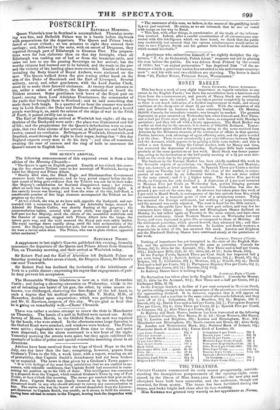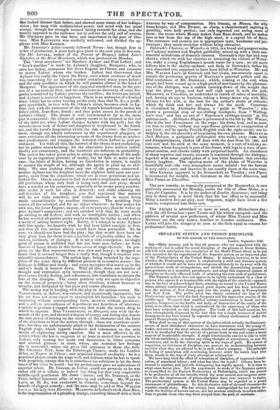THE THEATRES.
COVENT GARDEN commenced its early season prosperously, notwith- standing the inauspicious postponement of the opening-night, occa- sioned by the illness of Miss ADELAIDE REMBLE : the new play and afterpiece have both been successful, and the audiences, though not crowded, far from scanty. The house has been furbished during the recess, and looks bright and clean after its face-washing.
Miss KEMBLE was greeted very warmly on her appearance as Norma.
She looked thinner than before, and showed some traces of her indispo- sition ; but sang with undiminished power, and acted with her usual energy, though her strength seemed failing towards the close, and she
mutely appealed to the audience not to enforce the only call of encore. Mr. GIUBILEI gave its due force and importance to the part of Oro- veso. Miss BAINFORTH was cordially welcomed, and divided the ap- plause with Miss KIMBLE.
Mr. JERROLD'S petite comedy followed Norma : but, though first in order of production, it must here give place to the new play in five acts, (by Mr. LOVELL, author of the Provost of Bruges,) called Love's Sacrifice, or the Rival Merchants, which was produced on Monday. The "rival merchants" are Matthew Aylmer and Paul Lafont ; and 4' love's sacrifice" is made by Aylmer's daughter, Margaret ; who, to -save her father, renounces her lover Eugene de l'Orme, and consents to marry Lafont, whom she loathes. Lafont had discovered that Aylmer was really the Count Du Barry, over whom sentence of death was impending for an alleged murder committed many years before ; and the only condition on which he will promise silence is the hand of Margaret. The appearance of the supposed murdered man, in the per- son of a mysterious friar, and the simultaneous discovery of some for- geries committed by Lafont, prevent the sacrifice; the lovers are united, and Aylmer is restored to happiness. There is an underplot of a farcical kind, which has no other bearing on the story than that St. Lo, a profli- gate spendthrift, in love with De FOrme's sister, becomes clerk to La- font, and, with the assistance of the old rogue's housekeeper, makes his -fellow-clerk, Jean Ruse, drunk ; and thus gains access to the proofs of Lafont's villany. The drama is well constructed so far as the main -plot is concerned : the climax of misery seems to be attained at the end -of the third act, when Lafont charges Aylmer with his guilt ; but the wretchedness both of father and daughter is heightened in the fourth act, and the lover's desperation swells the tide of sorrow : the denoue- ment, though not wholly unforeseen by the experienced playgoer, at once extricates all the interesting persons of the drama from an unplea- sant predicament, and consigns the defeated villain Lafont to just pu- nishment. Yet with all this, the interest of the drama is not enchaining, nor its pathos overwhelming; for the characters have neither indivi- duality nor consistency, and the incidents are deficient in probability. The author has taken great pains to entrap the sympathies of his audi- ence by an ingenious pretence of reality, but he fails to make out his ease : the fabric of fiction, having no foundation in nature, is unable to sustain the weight of wo, although the agony is piled up so skil- fully. We care nothing about any one of the persons concerned : neither Aylmer nor his daughter have the slightest hold upon our sym- pathy, apart from the situations; which are at once gratuitous and un- looked-for. One is surprised to find that such a respectable and worthy old gentleman, whose only fault is being very dull and prosy, should have a murder on his conscience, especially as he seems pretty comfort- able under it until his alias is detected ; and while admiring the self-devotion of his daughter, you feel convinced that matters will be set right somehow, and rather inclined to resent being made uncomfortable by needless distresses. The meddling friar causes all the mischief, and for no object whatever: he first makes his own son, the lover Eugene, uneasy, all to no purpose ; then he wakes up poor Aylmer's conscience; and not satisfied with that, he must needs go tattling to old Lafont, still with no intelligible motive ; and when he has worried all parties pretty nearly to death, he stalks in and makes a merit of setting matters right. Really, it 's enough to make Aylmer stab him again : we heartily wish he had been killed outright at first, and then all this useless misery would have been prevented. To be sure, we should not have had the play ; but that would have been no very great loss, for there is not a particle of originality either in cha- racters, incidents, or dialogue. It is not a vital conception ; no single germ of nature is unfolded that has not been seen before ; no fresh flowers of fancy bloom in this hortus siccus of stage-rhetoric. Its pro- gress on the first representation was slow and heavy ; it dragged so much that it seemed longer than it really was, though it requires con- siderable retrenchment. The action lags ; being retarded by the repe- tition of the same thing by different persons in successive scenes : the dialogue is diffuse and wordy ; and every metaphor that starts up in the author's brain is bunted down. With all this, there are beauties of thought and expression aptly introduced, though they are not new : good sense, kindly feeling, and refinement, also contribute to elevate the tone of the dialogue. The comic portions only are open to objection on the score of propriety ; being often frivolous, without humour or vivacity, and disfigured by bad puns and coarse allusions.
The acting was in keeping with the play in the serious scenes. Mr. VANDEsaroes, as Aylmer, was earnest, and occasionally impressive ; but his art does not seem equal to accomplish his intention : his style is lumbering without corresponding force, massive without grandeur ; and a certain uncouthness of deportment and heaviness of utterance cambine to produce a rugged monotony that made the scenes drag in which he appears. Miss VANDENHOFF, as Margaret, rose with the de- mands of the part, and showed a degree of energy and daring that denote the rare power of relying on the nature of the character and the force of the situations to bear the actress through : these are excellent quali- ties; but they are unfortunately allied to the declamation of the modern English stage, which regards loudness and vehemence as the only means of expressing strong emotion. She is most effective in the scenes where she has to suppress or at least to control her aversion to Lafont, only venting her scorn and detestation in bitter sarcasms and averted glances : in short, where she restrains her feelings she is successful, where she gives full utterance to them she fails. Mr. CHARLES Peer, from the Edinburgh Theatre, made his London debut, as Eugene de I 'Orme ; and acquitted himself creditably : he is a practised player, treads the stage well, and delivers what he has to speak with propriety, except that he is sometimes too solicitous to let the deep tones of his voice be heard : but his performance gave no indications of superior talent. Mr. COOPER, as Lofont, could not persuade us he was either old or a villain, or indeed any thing but that very respectable middle-aged gentleman Mr. Jostx COOPER; and Mr. DIDDEAR, as the Friar, looked innocent alike of mystery and suffering. Mr. WALTER LACY, as St. Lo, was exuberant in vivacity, sometimes beyond the bounds of elegant comedy ; and the same may be said of Mrs. WALTER LACY, a- his lady-love Herminee. MEADOWS, as Lafont's clerk Jean Ruse, Is the impersonation of a plodding drudge, consoling himself with a little knavery by way of compensation. Mrs. Owen, as Maims, the wily housekeeper, and Mrs. Monne, as Jenny, a chambermaid aspiring to gentility, were both perfect ; one only regretted not seeing more of them : the scene where Manou makes Jean Ruse drunk, and he makes love to her from the top of the high stool, is a capital bit of farce. The costumes and scenery are in appropriate taste, handsome and pic- turesque; they merit attention without being obtrusive. Gertrude's Cherries, or Waterloo in 1835, is a broad and pungent satire on Cockney tourists and English gullibility, mixed up with a little sen- timental melodrama of domestic interest. Gertrude's ripe lips and rosy cheeks, which vie with her cherries in attracting the visiters of Water- loo, make a young Englishman's mouth water for a taste : an old uncle follows him to the cherry-orchard, and finds in Gertrude's father his own discarded son, supposed to have been killed at Waterloo. Mr. and Mrs. WALTER LACY, as Gertrude and her swain, are scarcely equal to sustain the ponderous gravity of BARTLEY'S paternal pathos and the filial tenderness of Mr. DIDDEAR ; which, coming at the end, when people had been wound up to a high pitch of merriment by the pleasant- ries of the dialogue, was a sudden running-down of the weight that kept the piece going, and had well nigh upset it with the jerk. MEADOWS, as Crossbone, an undertaker in search of relics of mortality, and, having an eye to business, taking a honey-moon trip with Mrs. Homily for his wife, is the butt for the author's shafts of ridicule; which fly thick and fast, and always hit the mark. Crossbone is victimized by Alcibiades Blague, a "guide to Waterloo "; who grows a perennial crop of ten-shilling toothpicks from " Welling- ton's tree, and has no end of " Napoleon's cribbage-boards" at five guineas each. Alcibiades Blague is personated to the life by Mr. Wmau, who is the best Frenchman on 'the stage : his dress, look, and manner, are true to nature, without any superfluous grimace or exaggeration of any kind ; and he speaks French-English with the right accent, not in- dulging in the old absurdity of translating his own phrases. HARLEY as Jack Halcyon, a peripatetic philosopher who walks away 110M debts and disappointments, shakes off duns with the dust from his ieet, and cuts care and his stick at the same moment, is a sort of walking au- tomaton, whose knapsack is part of his frame, with legs in a state of per- petual motion, and cheeks ruddy with perpetual health. An abundance of sharp repartee and caustic sarcasm is scattered through the dialogue ; together with some capital jokes of a less bitter humour, that provoke hearty laughter. The opening-scene of the plains of Waterloo is beautifully real—the very atmosphere seems natural : but the harvest is very early; corn and cherries do not usually ripen at the same time.
MISS KEMBLE appeared in the Sonnambula on Tuesday ; and Figaro is announced for tonight, with GIUBILEI as the Count Almaviva, and Miss POOLE as Cherubino.



























 Previous page
Previous page